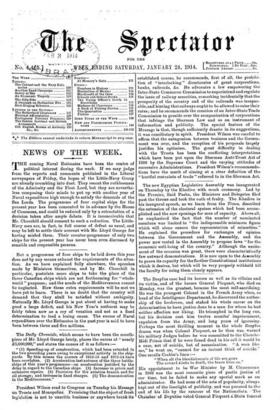President Wilson read to Congress on Tuesday his Message bh.
Trusts and Monopolies: Premising that the object of fresh legislation is not to-al:meals- business-el' aniiabers hreakaa established course, he recommends, first of all, the Prohibi- tion of "interlocking" directorates of great corporations, banks, railroads, Stu He advocates a law empowering the Inter-State Commerce Commission to superintend and regulate the issiie of railway severities, remarking incidentally that the prosperity of the country and of the railroads was insepar- able, and hinting that railways ought to be allowed to raise their rates; and he recommends the creation of an Inter-State Trade Commission to preside over the reorganization of corporations that infringe the Sherman Law and se an instrument of information and publicity. The special feature of the Message is that, though sufficiently drastic in its suggestions, it was conciliatory in spirit. President Wilson was careful to affirm that the antagonism between business and the Govern- meat was over, and the reception of his proposals largely justifies his optimism. The great difficulty in dealing with the Trusts has been the conflicting interpretations whioh have been put upon the Sherman Anti-Trust Act of 1890 by the Supreme Court and the vazying attitudes of successive Administrations. President Wilson's recommenda- tions have the merit of aiming at a clear definition of the " hurtful restraints of trade" referred to in the Sherman Act.






































